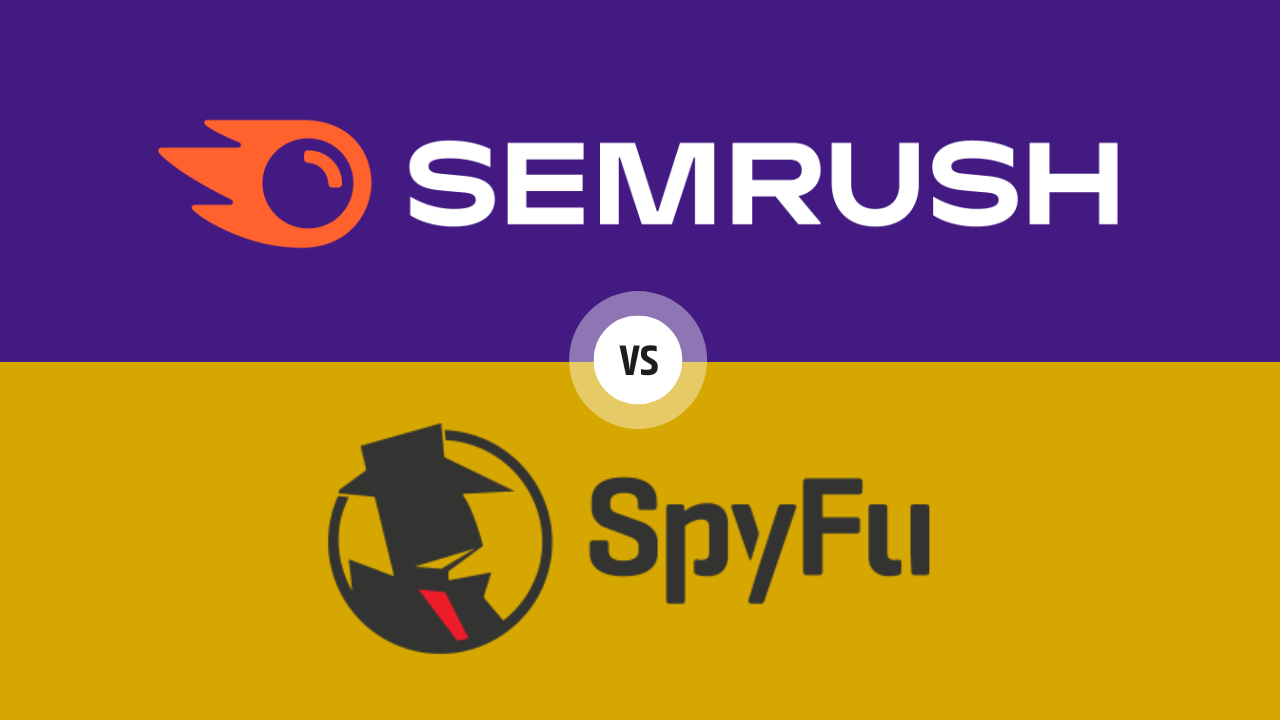Impact-Site-Verification: 384d1998-c65d-40a1-9a6b-f7907dab9db9
“Spyfu vs Semrush” is a common comparison that many SEO professionals and digital marketers deliberate upon when choosing the best tool for their SEO and marketing needs. Both Spyfu and Semrush are renowned for their robust capabilities in areas such as keyword research, competitor analysis, and SEO strategy enhancement. This blog post aims to delve into a detailed comparison of these two tools, covering various aspects like ease of use, keyword research capabilities, SEO auditing tools, and more. By the end of this article, you will gain a clearer understanding of which tool, Spyfu or Semrush, aligns best with your specific requirements, aiding you in making an informed decision for your digital marketing strategy.
Table of Contents
Ease of Use
When comparing Spyfu and Semrush in terms of ease of use, it’s essential to consider how user-friendly each tool is, especially for beginners or those with limited technical SEO knowledge. The focus keyword “Spyfu vs Semrush” is particularly relevant here as ease of use can be a deciding factor for many users.
Spyfu presents a straightforward interface that is accessible even to beginners. The dashboard is well-organized, allowing users to easily navigate through different features such as keyword research, domain overviews, and competitor analysis. Its simplicity does not overwhelm new users, making it an excellent choice for those who are just starting out in SEO or PPC.
On the other hand, Semrush offers a more feature-rich interface. While this might be slightly overwhelming for beginners, it provides a comprehensive suite of tools for advanced users. The initial learning curve might be steeper compared to Spyfu, but it’s worth the effort given the depth of data and analysis available. Semrush’s dashboard is robust and detailed, offering insights into various aspects of SEO and digital marketing.
Dashboard of Spyfu
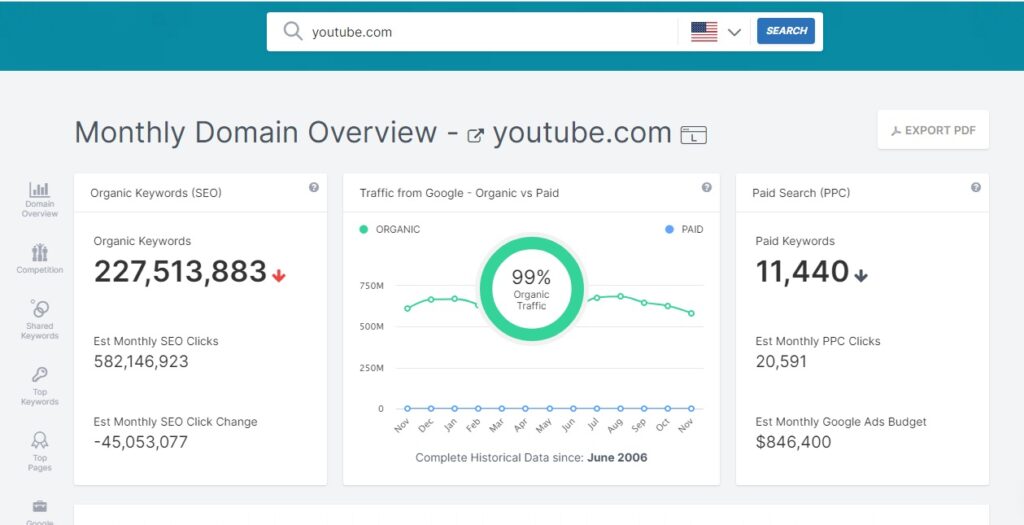
Dashboard of Semrush
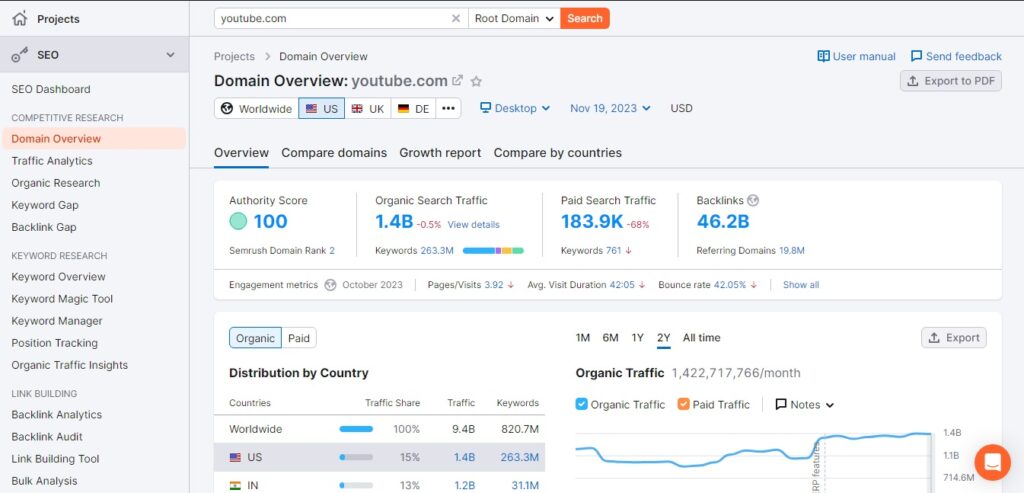
Key Points for Ease of Use Comparison:
- Layout and Design: Spyfu’s layout is more straightforward, making it easier for beginners to understand. Semrush, with its comprehensive features, has a more complex layout, suited for users who require detailed analytical data.
- Navigation and User Interface: Both tools have distinct navigation styles. A comparison of the menu structures or feature access points could be visually represented through images.
- Learning Resources: It’s worth noting the availability and quality of tutorials, guides, and customer support provided by both tools. This aids in understanding how quickly a new user can adapt to these platforms.
In conclusion, the ease of use in “Spyfu vs Semrush” largely depends on the user’s proficiency and requirements. Spyfu wins in terms of simplicity and user-friendliness, ideal for beginners or small businesses. Semrush, although it has a steeper learning curve, is incredibly powerful for seasoned marketers and larger businesses looking for in-depth analysis.
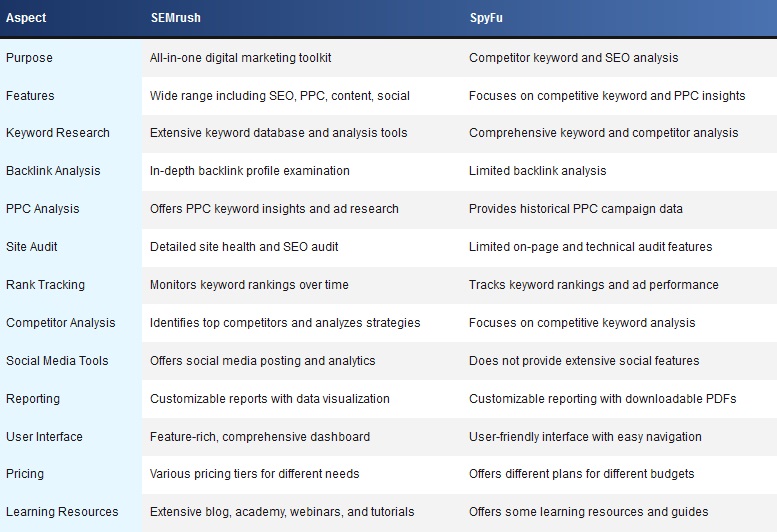
Keyword Research Capabilities
In the “Spyfu vs Semrush” debate, the keyword research capabilities of each tool are a critical factor to consider. Both Spyfu and Semrush offer extensive features for keyword research, but their approaches and functionalities vary, catering to different user needs.
Spyfu excels in providing detailed insights into competitors’ keyword strategies. It allows users to see which keywords competitors have been successful with in both organic search and PPC campaigns. This makes Spyfu a powerful tool for understanding the competitive landscape and identifying potentially lucrative keywords. One of Spyfu’s standout features is its historical data on keywords, offering insights into trends over time.
Semrush, on the other hand, offers a broader set of keyword research tools. It provides users with extensive data on keyword volume, trends, difficulty, and CPC (Cost Per Click). Semrush’s keyword magic tool is particularly noteworthy, offering thousands of keyword suggestions along with valuable metrics to help in decision-making. Its ability to give detailed reports on SERP features for each keyword is also a significant advantage.
Semrush Keyword Magic Tool
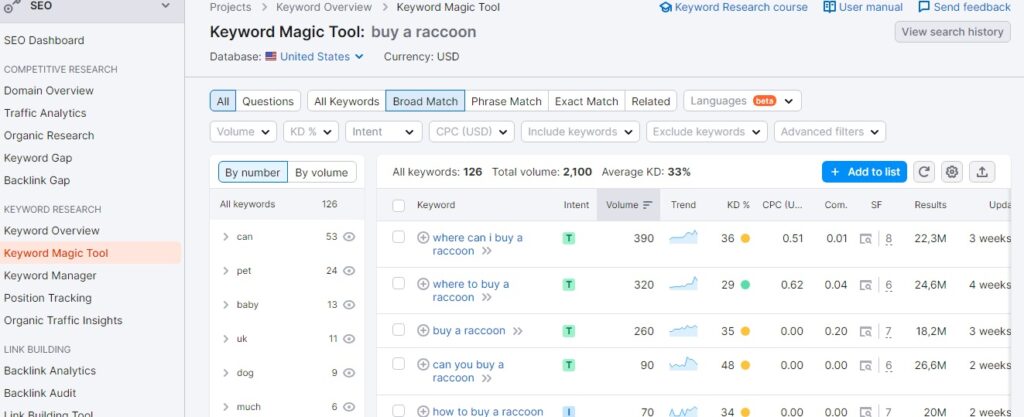
Spyfu Keyword Overview
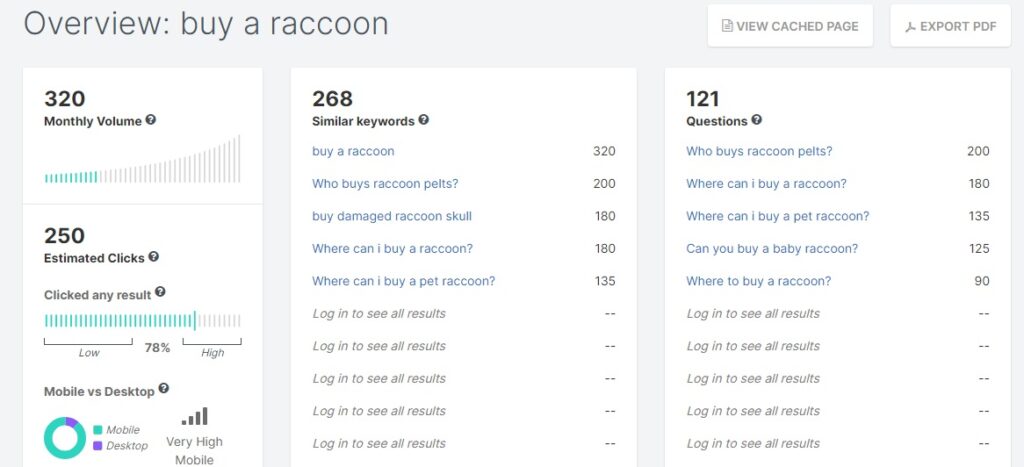
Key Points for Keyword Research Capabilities:
- Keyword Suggestions and Variations: Both tools provide a multitude of keyword suggestions. Visuals showing the depth and variety of keyword suggestions from each tool can be illuminating.
- Competitive Analysis: Screenshots showing how Spyfu displays competitor keyword data, compared to Semrush’s approach, can highlight their differences in competitive intelligence.
- Metrics and Data Analysis: An image comparing the detailed metrics (like search volume, keyword difficulty, and CPC) provided by Semrush with Spyfu’s historical data view would be useful.
- SERP Analysis: A visual representation of Semrush’s SERP analysis feature, illustrating how it breaks down the search engine results page for specific keywords, can underscore its utility.
In summary, when assessing “Spyfu vs Semrush” for keyword research capabilities, it’s clear that both tools have their strengths. Spyfu is particularly strong in competitor keyword analysis and historical data, while Semrush offers a more comprehensive suite of keyword research tools with detailed metrics and SERP analysis. The choice between them depends on whether the user prioritizes competitive insights or a broad array of keyword data for their SEO strategy. Adding relevant images that highlight these features in action will greatly enhance the reader’s understanding of each tool’s capabilities.
Competitor Analysis
In the context of “Spyfu vs Semrush,” understanding how each tool performs in competitor analysis is essential. Competitor analysis is a critical aspect of SEO and digital marketing, as it helps businesses understand their market position and identify strategies used by competitors.
Spyfu shines in this aspect with its in-depth competitor analysis capabilities. It allows users to delve deep into competitors’ search marketing strategies, including detailed insights into their paid and organic search history. Spyfu’s ability to track every keyword a competitor has bought on Google Ads, every organic rank, and every ad variation in the last 14 years is particularly impressive. This historical data is invaluable for businesses looking to understand long-term trends in their industry.
Semrush, while also strong in competitor analysis, approaches it with a broader scope. It provides comprehensive data on competitors’ online strategies, including their SEO, content marketing, and social media strategies. Semrush’s competitive intelligence suite includes domain overviews, traffic analytics, and market explorers, which offer a broader view of a competitor’s digital footprint.
Semrush SERP Analysis
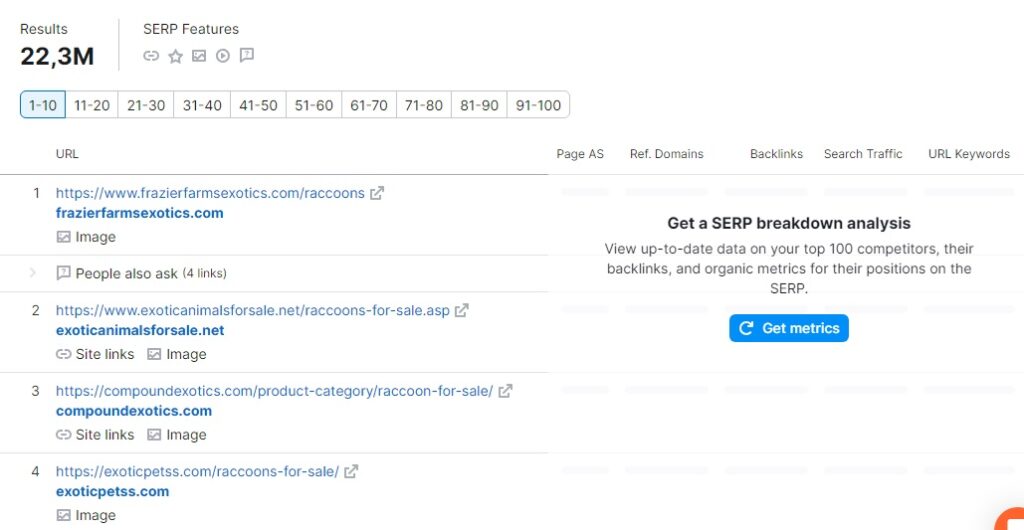
Spyfu Ranking Analysis
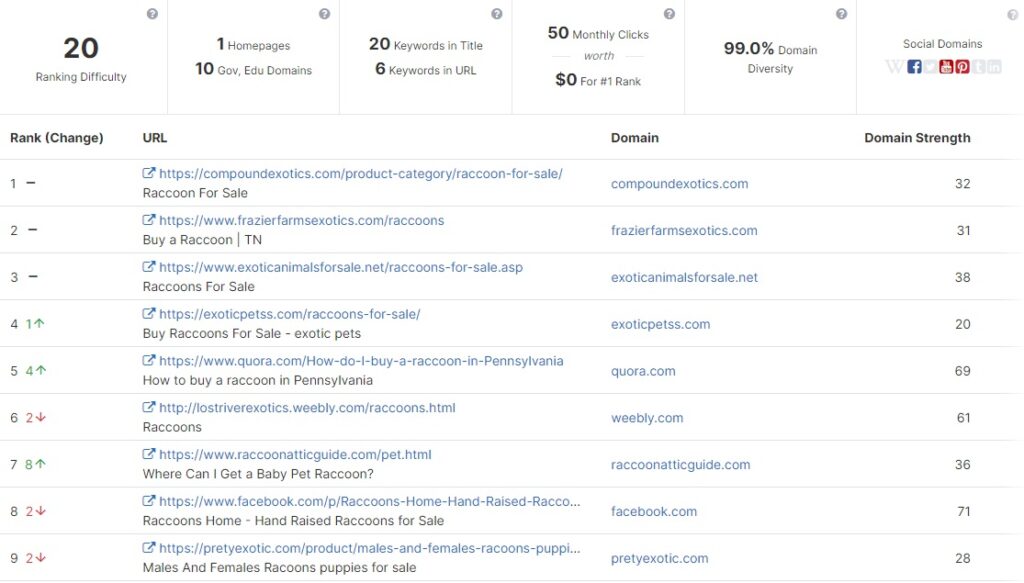
Key Points for Competitor Analysis:
- Competitor Keyword and Ad Strategies: A side-by-side image comparison of how Spyfu and Semrush present competitor keyword and ad strategies can highlight the differences in their data presentation.
- Historical Data Analysis: A screenshot showcasing Spyfu’s historical data feature would emphasize its capability to track competitors’ strategies over time.
- Market Overview: An image depicting Semrush’s market explorer tool can illustrate its ability to provide a broader market analysis, including industry benchmarks and audience insights.
In summary, when evaluating “Spyfu vs Semrush” for competitor analysis, both tools offer robust capabilities, but with different focal points. Spyfu is particularly adept at providing detailed, historical data on competitors’ search marketing strategies, making it ideal for businesses focusing on search-driven competitor analysis. Semrush, with its comprehensive suite of tools, offers a broader view of a competitor’s online presence, including SEO, content, and social media strategies. Including images that showcase these features in action will not only make the content more engaging but also help readers visually compare the strengths of each tool.
SEO Auditing Tools
When it comes to SEO auditing tools, the “Spyfu vs Semrush” comparison reveals distinct features and capabilities that each platform offers. SEO auditing is crucial for identifying weaknesses in your website’s search engine performance and implementing strategies to improve its ranking and visibility.
Spyfu offers a focused and user-friendly SEO audit tool. It provides a comprehensive analysis of your website, identifying issues like broken links, poor keyword optimization, and other technical SEO problems. Spyfu’s strength lies in its simplicity and directness, making it a good choice for small businesses or individuals who need straightforward, actionable insights without being overwhelmed by too much data.
Semrush, on the other hand, offers a more advanced SEO audit tool. It covers a wide range of technical and on-page SEO aspects, including site health, crawlability issues, HTTPS security protocols, and comprehensive on-page SEO advice. Semrush’s SEO auditing tool is more detailed and technical, suitable for users who require an in-depth analysis of their website’s SEO performance.
Semrush Reports
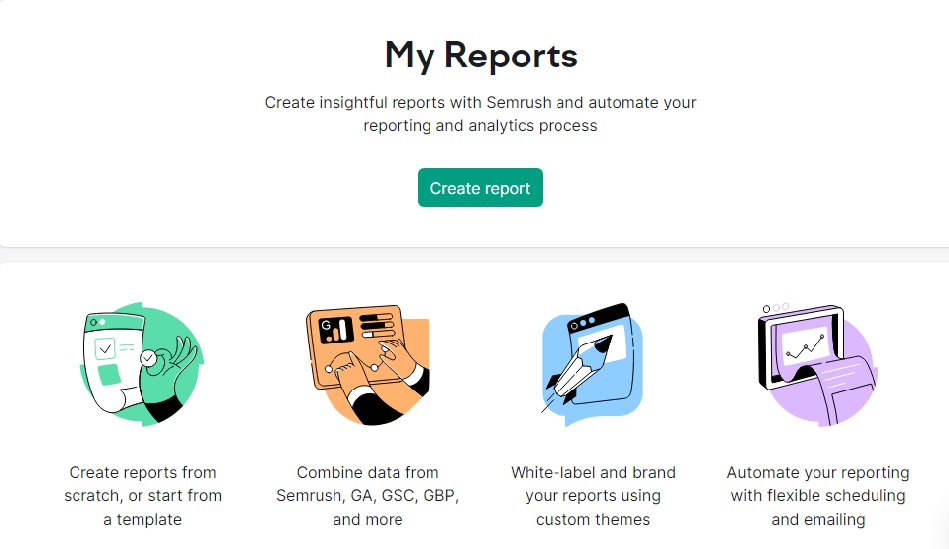
Spyfu Reports
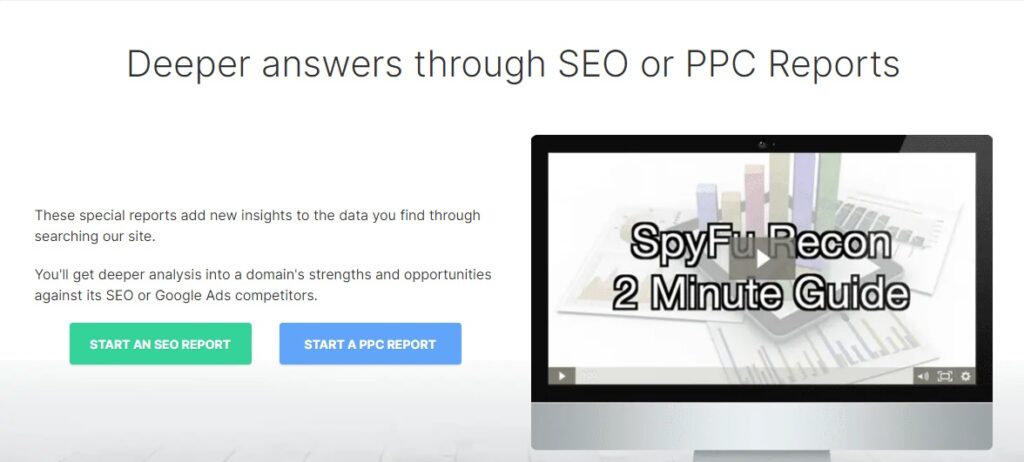
Including screenshots of the SEO audit reports generated by both Spyfu and Semrush would be beneficial here. These images can visually demonstrate the type of data and insights each tool provides, such as error reports, site health scores, and specific optimization recommendations.
Key Points for SEO Auditing Tools:
- Audit Report Overview: A screenshot showcasing the summary or overview section of the audit reports from both Spyfu and Semrush. This gives readers a quick glimpse of how each tool presents its findings.
- Issue Identification and Recommendations: An image highlighting a section of the report where specific issues are identified, and recommendations are given. This can illustrate how actionable and detailed the insights from each tool are.
- User Interface and Ease of Navigation: Visuals that show the user interface of the SEO audit tool in both platforms can help readers understand the ease of use and navigation, which is important for less technical users.
In conclusion, in the “Spyfu vs Semrush” analysis for SEO auditing tools, Spyfu offers a more straightforward approach, ideal for those who need quick, actionable insights without the need for deep technical knowledge. Semrush, with its comprehensive and detailed audit capabilities, is more suitable for users who require an extensive, in-depth analysis of their website’s SEO health. Images showcasing key features of both tools’ audit reports would greatly enhance the reader’s understanding and help in making an informed decision.
Rank Tracking
Rank tracking is a vital component in SEO management, and in the context of “Spyfu vs Semrush,” each offers distinct functionalities that cater to various needs.
Spyfu is highly regarded for its ability to track the historical performance of keywords. This feature is particularly useful for businesses looking to understand long-term trends in their SEO strategies. Spyfu provides a clear and concise view of where your website stands in search engine results for specific keywords over time. Additionally, it allows tracking the keyword rankings of competitors, offering valuable insights into their SEO strategies.
Semrush offers a more dynamic approach to rank tracking. It provides real-time updates on keyword positions, catering to businesses that require up-to-the-minute data. Semrush’s rank tracking tool is capable of tracking keywords across different devices and geographic locations, making it a versatile choice for both local and global SEO strategies. Furthermore, the integration of rank tracking with other features like keyword research and site audits makes Semrush a comprehensive tool for SEO management.
Semrush Ranked
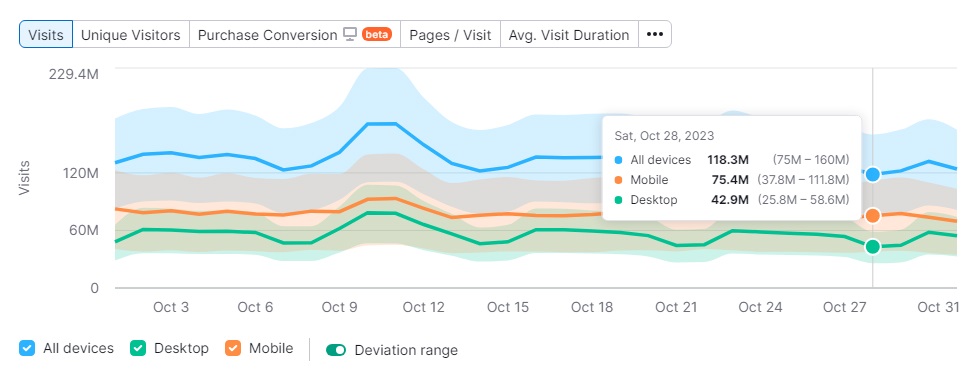
Spyfu Ranked
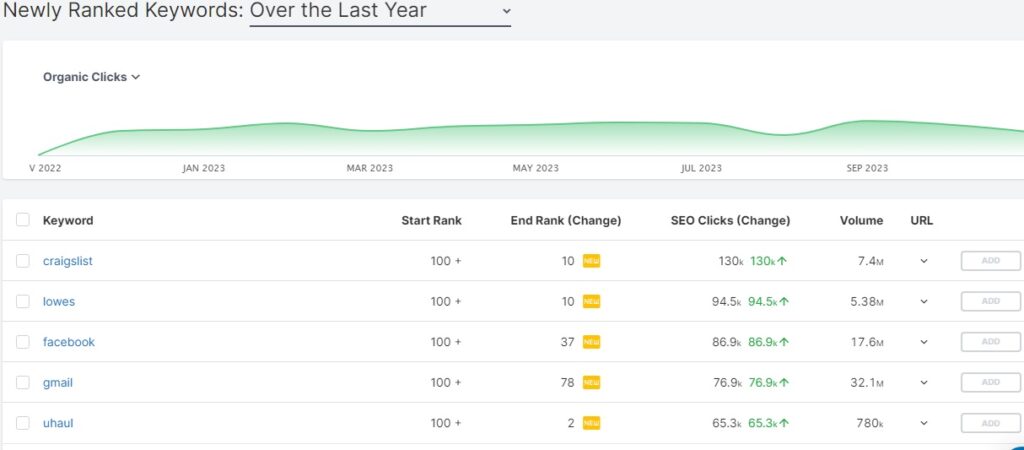
Key Points for Rank Tracking:
- Historical Ranking Data: A graph or chart from Spyfu that illustrates the historical ranking trends for specific keywords. This visual element can emphasize the long-term insights provided by Spyfu.
- Real-Time Ranking Updates: A screenshot from Semrush showing its real-time rank tracking capabilities. This would highlight the up-to-date information that Semrush offers.
- Comparative Analysis: Visuals comparing the rank tracking features of both tools can help readers understand the strengths and differences in their approaches to rank tracking.
In summary, when considering “Spyfu vs Semrush” for rank tracking capabilities, Spyfu stands out for its historical data analysis, which is valuable for understanding long-term SEO trends. Semrush, with its real-time data and comprehensive tracking across devices and locations, is ideal for businesses needing current and versatile rank tracking solutions. Adding images that showcase these functionalities in action will not only make the content more engaging but also provide a clear, visual understanding of the distinct advantages each tool offers.
Content Marketing Tools
In the arena of content marketing tools, the “Spyfu vs Semrush” comparison highlights distinct features and strengths each platform offers to content marketers.
Spyfu primarily focuses on competitive intelligence, which is highly beneficial for content marketers. Its tools allow users to analyze competitors’ content strategies, including the keywords they target and the types of content that perform well for them. This insight is invaluable for crafting content that can compete effectively in the same space. Spyfu’s strength lies in its ability to reveal gaps in competitors’ content strategies, offering opportunities for users to capitalize on.
Semrush, meanwhile, offers a more comprehensive suite of content marketing tools. It provides features like content ideation, SEO content template creation, and content audit functionalities. Semrush’s content marketing platform enables users to not only generate ideas for content based on trending topics and keywords but also to optimize content for SEO from the outset. Additionally, its content audit tool helps users evaluate their existing content, identifying areas for improvement and updating.
Spyfu Content Marketing Tools

Semrush Content Marketing Tools

Key Points for Content Marketing Tools:
- Competitor Content Analysis: Images showing Spyfu’s interface where users can analyze competitors’ content strategies. This would visually demonstrate how Spyfu helps in identifying content gaps and opportunities.
- Content Ideation and Optimization: Screenshots of Semrush’s content marketing platform, highlighting tools for content idea generation and SEO content template creation. This would illustrate the depth of support Semrush offers for creating and optimizing content.
- Content Audit Tool: Visuals from Semrush showing the content audit feature, which can be instrumental in demonstrating how users can evaluate and improve their existing content.
In conclusion, when comparing “Spyfu vs Semrush” in the context of content marketing tools, Spyfu is very useful for competitive content analysis and identifying opportunities based on competitors’ strategies. Semrush, with its broader range of content marketing tools, is ideal for comprehensive content strategy development, including ideation, creation, optimization, and auditing. Including images of these tools in action would not only enrich the content but also provide a clear visual understanding of the functionalities each tool offers to content marketers.
Backlink Analysis
Backlink analysis is a critical aspect of SEO, and in the “Spyfu vs Semrush” comparison, each tool offers unique features for analyzing and building a strong backlink profile.
Spyfu has a robust backlink analysis tool that focuses on competitor backlink strategies. It allows users to see where competitors’ backlinks are coming from, helping to identify potential backlink opportunities for their own websites. Spyfu also provides insights into the quality and types of backlinks, which is crucial for understanding the strength of a competitor’s backlink profile. This feature is particularly useful for replicating successful backlink strategies and identifying high-authority domains in your niche.
Semrush, on the other hand, offers a more comprehensive backlink analysis tool. It not only analyzes the backlink profiles of competitors but also provides extensive data on your own website’s backlinks. Semrush’s tool includes features such as backlink auditing, which helps in identifying and removing potentially harmful backlinks, and a backlink gap analysis, which compares your backlink profile with that of your competitors to find opportunities for improvement.
Semrush backlinks

Spyfu backlinks
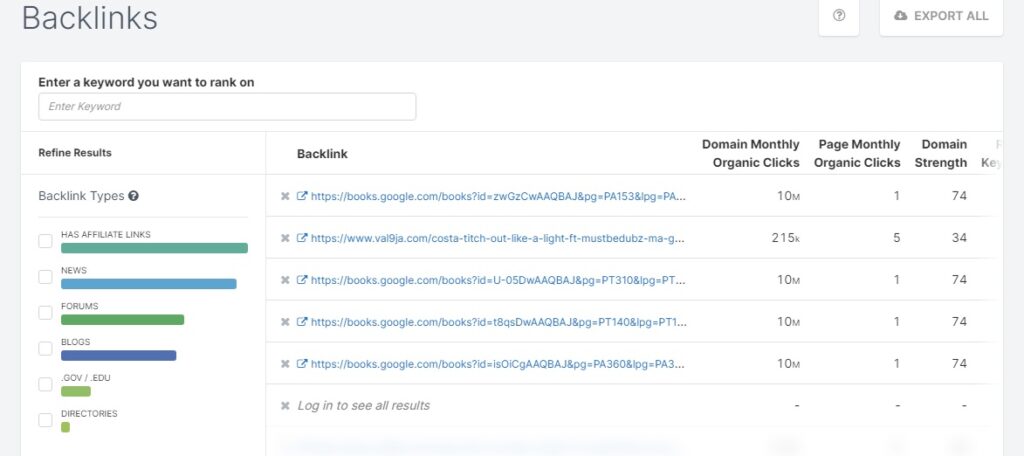
Key Points for Backlink Analysis:
- Competitor Backlink Analysis: Images showcasing Spyfu’s interface for analyzing competitors’ backlinks, highlighting the tool’s ability to identify where competitors are gaining their backlinks from.
- Backlink Audit: Screenshots of Semrush’s backlink audit feature, illustrating how it helps in identifying and managing potentially harmful backlinks to your site.
- Backlink Gap Analysis: Visuals from Semrush showing the backlink gap analysis tool, which can be instrumental in comparing your backlink profile with that of your competitors.
In summary, when considering “Spyfu vs Semrush” for backlink analysis, Spyfu is excellent for understanding and replicating competitors’ backlink strategies, while Semrush offers a more rounded solution with features for auditing and improving your own backlink profile. Including images of the backlink analysis features in both tools will not only make the content more engaging but also provide a clear visual representation of the different capabilities each tool offers.
Pricing and Plans
When considering the “Spyfu vs Semrush” comparison, understanding the pricing and plans offered by each tool is crucial for users to make an informed decision based on their budget and needs.
Spyfu offers a straightforward pricing model with plans that cater to both individuals and businesses. It typically includes a basic plan, a professional plan, and a team plan, each progressively offering more features and capabilities. The basic plan is often sufficient for individuals or small businesses, while the professional and team plans are better suited for agencies or larger businesses requiring more extensive data and reporting capabilities. One of Spyfu’s advantages is its unlimited search results and data exports, even on the lower-tier plans.
Semrush, in contrast, offers a more tiered pricing structure. Its plans usually include a Pro version, Guru version, and Business version, each designed to cater to different levels of usage and sophistication. The Pro plan is geared towards freelancers and startups, the Guru plan is more suited for small to medium-sized businesses, and the Business plan is ideal for agencies and large businesses with extensive SEO needs. Semrush plans are generally more expensive than Spyfu, but they also offer a broader range of features, particularly in higher-tier plans.
Semrush pricing

Spyfu pricing
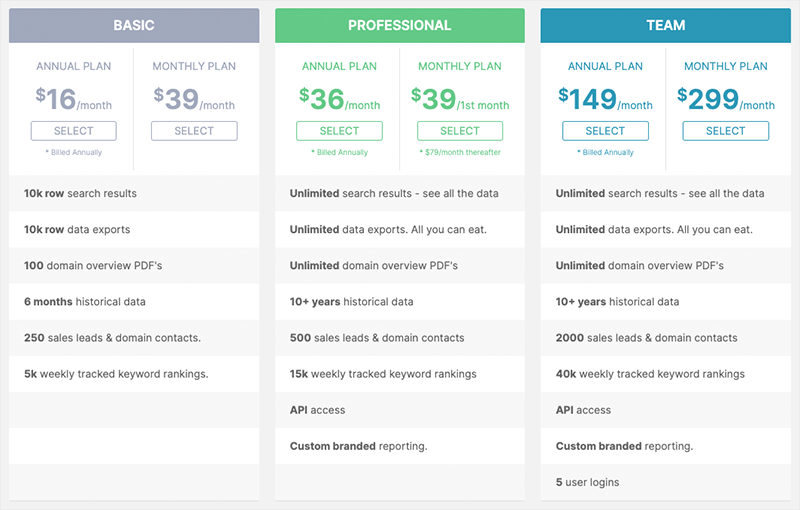
Key Points for Pricing and Plans:
- Plan Comparison: A comparative table or chart displaying the different plans and their prices from both Spyfu and Semrush. This would visually summarize the cost and what each plan offers.
- Feature Breakdown by Plan: Visuals showing a breakdown of the key features available in different plans of both tools. This helps in understanding which plan offers the best value for specific needs.
- Cost vs. Value Analysis: An infographic or visual representation comparing the cost of each plan against the value or range of features provided. This can assist users in making a cost-effective decision based on their requirements.
In conclusion, when assessing “Spyfu vs Semrush” in terms of pricing and plans, Spyfu offers a more straightforward and potentially cost-effective solution with unlimited data on all plans, making it appealing for individuals and small businesses. Semrush, while more expensive, provides comprehensive features and a broader range of tools, especially in its higher-tier plans, making it suitable for larger businesses and agencies. Including visual comparisons of the plans and features can significantly enhance the reader’s ability to make an informed choice based on their budget and SEO needs.
Support and Resources
Evaluating the “Spyfu vs Semrush” comparison in terms of support and resources offered is crucial for users who need guidance and assistance in their SEO and marketing efforts.
Spyfu provides solid customer support and a range of educational resources. Users have access to a variety of tutorials, how-to guides, and a comprehensive FAQ section that addresses common questions and challenges. While Spyfu’s direct customer support is praised for being responsive and helpful, it is primarily available via email. Additionally, Spyfu offers a blog that features useful insights and tips on SEO and PPC strategies.
Semrush, on the other hand, is known for its extensive support and educational resources. It offers a robust knowledge base, webinars, e-books, and a blog filled with in-depth articles on various aspects of digital marketing. Semrush’s customer support includes email, chat, and phone options, making it more accessible for immediate assistance. Furthermore, Semrush frequently updates its resources to reflect the latest trends and changes in the SEO and digital marketing world.
Semrush Resources

Spyfu Resources

Key Points for Support and Resources:
- Customer Support Options: Visuals depicting the customer support channels available for Spyfu and Semrush. This can include screenshots of the support contact pages or interfaces.
- Educational Resources: Images showcasing the types of educational materials like tutorials, blogs, and webinars offered by both platforms. This helps to visually represent the wealth of information available to users.
- User Interface for Support: Screenshots of how users navigate to find support and resources within each tool. This gives an idea of the user experience in seeking assistance or learning material.
In conclusion, when comparing “Spyfu vs Semrush” in terms of support and resources, both offer valuable materials and assistance, though in different capacities. Spyfu provides straightforward support suited for most users’ needs, while Semrush offers more extensive resources and multiple channels for customer support, catering to a broader range of user queries and learning preferences. Including visuals of their support pages and educational resources can help readers understand the depth and accessibility of the support offered by each tool.
Integrations and API
In the context of “Spyfu vs Semrush,” the scope and functionality of integrations and API access are important considerations, especially for users looking to streamline their digital marketing workflows and enhance data analysis capabilities.
Spyfu offers a straightforward approach to integrations and API access. While its range of direct integrations may be more limited compared to Semrush, Spyfu provides effective API access that allows users to integrate its data with other tools and systems. This API access is particularly beneficial for businesses that need to customize their data analysis and reporting processes. Spyfu’s API delivers comprehensive data on keywords, rankings, and competitor analysis, which can be integrated into custom applications or used alongside other marketing tools.
Semrush, renowned for its extensive functionality, offers a wider array of integrations with other marketing tools and platforms. These integrations include Google Analytics, Google My Business, Google Search Console, and social media platforms, enabling users to consolidate and analyze data across different channels seamlessly. Semrush also offers robust API access, allowing for advanced data manipulation and integration with custom systems and applications. This makes it an ideal choice for larger organizations or agencies that require deep data integration and extensive workflow automation.
Semrush API

Spyfu API
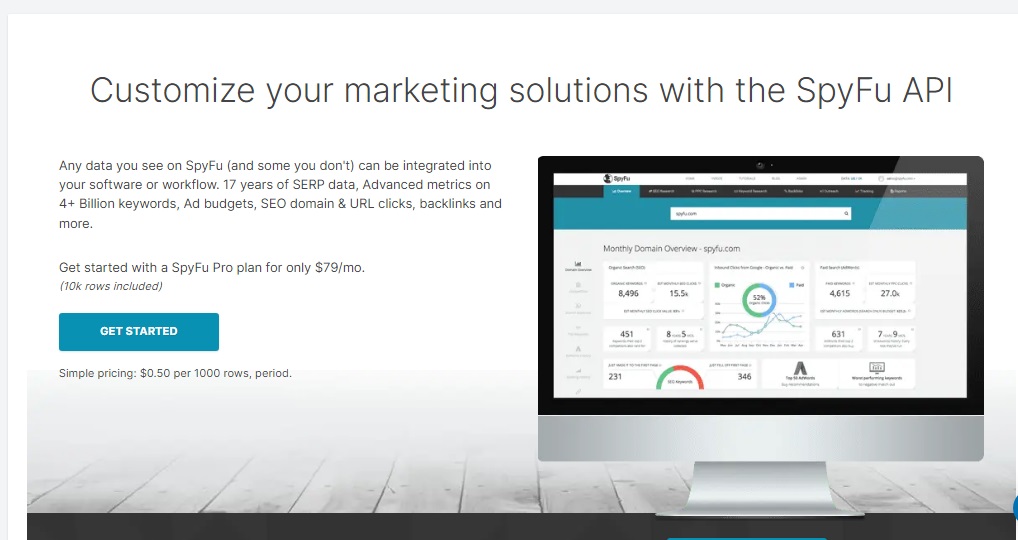
Key Points for Integrations and API:
- Integration Capabilities: Images showing the list of integrations available with Spyfu and Semrush, highlighting how these tools can connect with other platforms and services.
- API Access and Customization: Screenshots or diagrams illustrating the API interfaces of both tools, showcasing the kind of data access and customization they offer.
- Examples of Workflow Integration: Visuals or flowcharts depicting how Spyfu or Semrush can be integrated into a typical digital marketing workflow, enhancing overall efficiency and data coherence.
In conclusion, when evaluating “Spyfu vs Semrush” for integrations and API access, Spyfu offers a more focused API service for custom data needs, while Semrush provides a broader range of direct integrations and robust API capabilities, suitable for extensive marketing ecosystems. Including images that illustrate the integration capabilities and API interfaces of both tools will provide a clear visual representation of how they can enhance and streamline digital marketing efforts.
Reporting and Analytics
In the “Spyfu vs Semrush” comparison, the effectiveness of reporting and analytics features is crucial for users who rely on data-driven insights to shape their SEO and marketing strategies.
Spyfu offers comprehensive reporting tools that are particularly user-friendly. Its reports are easy to understand and provide key insights into SEO, PPC, and competitor analysis. Users can generate reports on keyword rankings, competitor strategies, and more, which are straightforward and actionable. Spyfu’s strength lies in presenting data in a clear, concise manner, making it an excellent choice for individuals or businesses that require quick insights without extensive data manipulation.
Semrush excels in providing a more in-depth and customizable analytics experience. Its reporting features are robust, offering a wide range of metrics and data points. Users can dive deep into website analytics, keyword research, backlink analysis, and competitor data. Semrush also allows for the customization of reports, enabling users to tailor data to their specific needs. The platform’s ability to integrate data from various sources, like Google Analytics and Google Search Console, further enhances its reporting capabilities.
Semrush Report
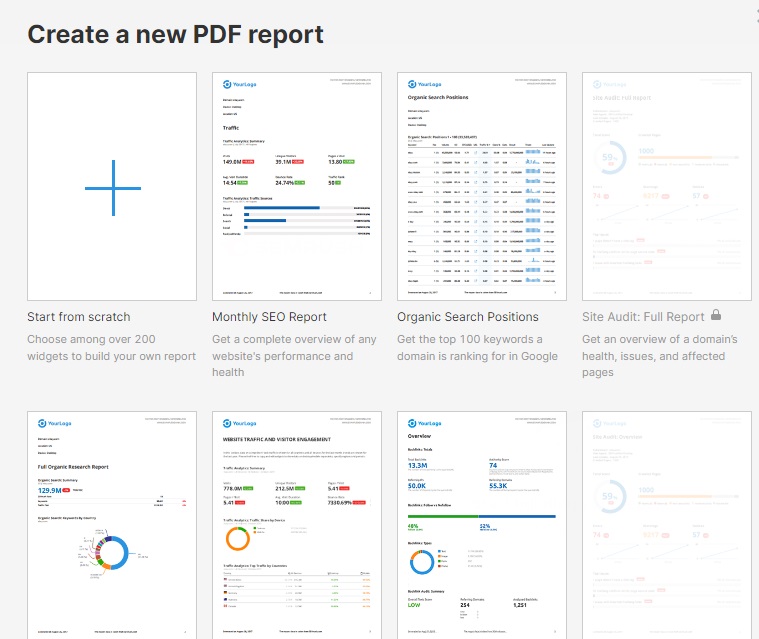
Spyfu Report
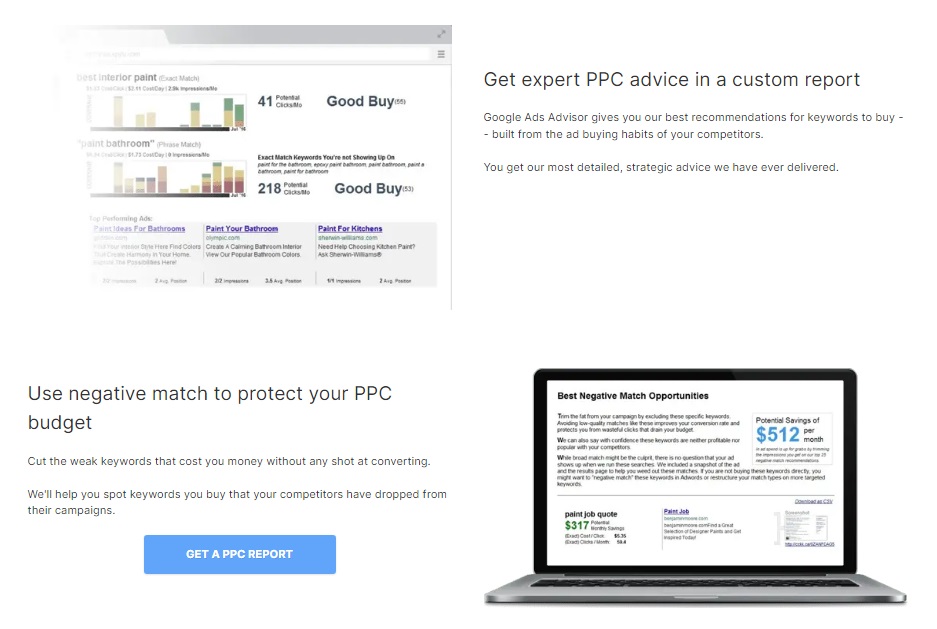
Key Points for Reporting and Analytics:
- Sample Reports: Images showing examples of reports generated by Spyfu and Semrush. This can include overviews of keyword performance, site audits, or competitor analysis.
- Data Visualization: Screenshots that highlight how each tool visualizes data, such as through graphs, charts, or tables. This will help users understand the ease of interpreting data from each platform.
- Customization Features: Visuals depicting the customization options available in Semrush’s reporting tools. This could illustrate how users can tailor reports to meet their specific requirements.
In conclusion, when comparing “Spyfu vs Semrush” in terms of reporting and analytics, Spyfu is notable for its straightforward, easy-to-understand reports, suitable for users who need quick insights. Semrush, with its comprehensive and customizable reporting capabilities, is ideal for users who require detailed analytics and the ability to tailor reports to specific needs. Including images of their reporting interfaces and sample reports will not only make the content more engaging but also provide a clear visual understanding of the reporting capabilities each tool offers.
Mobile Accessibility
In today’s fast-paced digital environment, mobile accessibility is a key factor in the “Spyfu vs Semrush” comparison, especially for users who need to access SEO and marketing tools on the go.
Spyfu offers limited mobile accessibility compared to Semrush. While there isn’t a dedicated mobile app, the Spyfu website is mobile-responsive, allowing users to access some features through a mobile browser. The mobile version of the website is designed to be user-friendly, with navigation and features adapted for smaller screens. However, the experience may not be as seamless or comprehensive as using Spyfu on a desktop.
Semrush, on the other hand, provides better mobile accessibility with a dedicated mobile app available for both iOS and Android devices. The app allows users to access key features of Semrush, including site audits, keyword tracking, and analytics reports, directly from their mobile device. The interface is optimized for mobile use, making it easier to navigate and use the tool effectively while on the move.
Key Points for Mobile Accessibility:
- Mobile Website Interface: An image showing Spyfu’s mobile-responsive website, highlighting its adaptability and user interface on a smaller screen.
- Semrush Mobile App: Screenshots of the Semrush mobile app, displaying its layout, navigation, and key features accessible through the app.
- Comparison of Mobile Experience: A side-by-side visual comparison of Spyfu’s mobile website and Semrush’s mobile app could help in illustrating the differences in mobile accessibility and user experience offered by each tool.
In conclusion, when assessing “Spyfu vs Semrush” for mobile accessibility, Spyfu provides basic mobile responsiveness through its website, which is suitable for users who perform occasional, less complex tasks on mobile. Semrush, with its dedicated mobile app, offers a more comprehensive and user-friendly mobile experience, ideal for users who frequently manage their SEO and marketing activities on the go. Including images that visually compare the mobile interfaces of both tools will enhance the reader’s understanding of their mobile capabilities.
Customer Reviews and Testimonials
When evaluating “Spyfu vs Semrush,” customer reviews and testimonials play a significant role in understanding how real users perceive and benefit from these tools. These insights can provide valuable perspectives that go beyond feature lists and technical specifications.
Spyfu is often praised in customer reviews for its user-friendly interface and excellent value for money, particularly for small businesses and individual marketers. Users appreciate its straightforward approach to competitor analysis and keyword research, making it a preferred choice for those new to SEO or with limited budgets. However, some reviews point out that Spyfu might lack the depth in data and features that more advanced users or larger businesses may require.
Semrush generally receives positive feedback for its comprehensive suite of tools and features, making it a favorite among SEO professionals and larger agencies. Customers often highlight its extensive data, robust reporting capabilities, and effective site audit tools. While Semrush is typically seen as offering great value, some users mention its higher price point and a steeper learning curve as considerations.
Semrush Reviews

Spyfu Reviews

Key Points for Customer Reviews and Testimonials:
- User Feedback Summary: Images or graphics that summarize user ratings or highlight key feedback points for both Spyfu and Semrush. This can include star ratings, quotes from reviews, or testimonials.
- Diverse User Perspectives: Visual representations of reviews from different types of users, such as small business owners, individual marketers, and large agencies. This can help show the range of users and how their needs are met by each tool.
- Comparative Review Graphics: A comparative graphic or chart that visually represents the strengths and weaknesses of each tool as pointed out by users. This could include aspects like ease of use, feature range, and pricing.
In conclusion, customer reviews and testimonials are an important aspect of the “Spyfu vs Semrush” comparison, offering insights into real-world experiences with these tools. Spyfu is often recommended for its simplicity and affordability, particularly for beginners and small businesses, while Semrush is favored for its comprehensive features and depth of data, suitable for SEO professionals and larger organizations. Including visuals of user reviews and ratings can provide a relatable and authentic dimension to the comparison, helping readers make a more informed decision.
Conclusion and Recommendations
In concluding the “Spyfu vs Semrush” comparison, it’s clear that both tools offer valuable features for SEO and digital marketing, but they cater to different needs and user profiles.
Spyfu is an excellent choice for small businesses, startups, and individual marketers who need a straightforward, affordable tool for competitor analysis and keyword research. Its user-friendly interface and clear reporting make it accessible even for those with limited SEO experience. Spyfu is particularly recommended for users who need quick insights and a direct approach to SEO and PPC strategies without the complexity of more advanced tools.
Semrush, on the other hand, stands out for its comprehensive suite of features and tools, making it a preferred choice for SEO professionals, larger businesses, and agencies. Its depth in data, extensive reporting capabilities, and robust site audit and rank tracking tools make it ideal for users who require a detailed and versatile SEO platform. Semrush is best suited for those who need an all-in-one solution for in-depth digital marketing and SEO analysis, even if it comes at a higher price point.
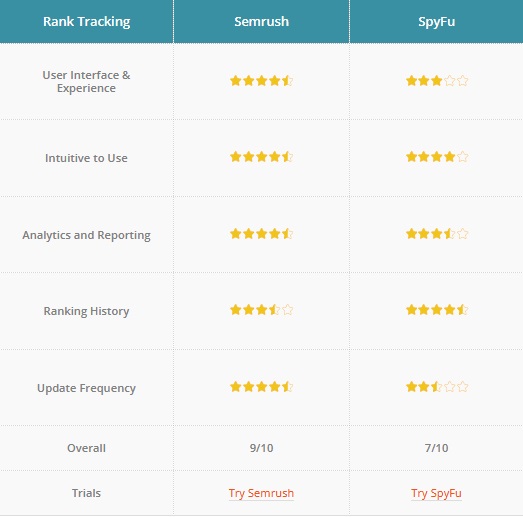
Final Recommendations:
- For small businesses, startups, and individual marketers with limited SEO experience or those looking for a straightforward tool for basic SEO tasks, Spyfu is the recommended choice.
- For SEO professionals, larger companies, and agencies needing a comprehensive, feature-rich tool for in-depth SEO and digital marketing analysis, Semrush is the preferable option.
In summary, both Spyfu and Semrush have their unique strengths and are tailored to different user needs in the SEO and digital marketing landscape. Your choice between “Spyfu vs Semrush” should be based on your specific requirements, expertise level, and budget. Including a visual summary can effectively consolidate this information, providing a quick reference for users to decide which tool aligns best with their objectives.
Conclusion
In the realm of SEO and digital marketing, the choice between Spyfu and Semrush is not about which tool is universally better, but rather which tool better aligns with your specific needs, expertise, and goals. Both Spyfu and Semrush are formidable tools in their own rights, each with unique strengths and offerings.
Spyfu is an excellent option for those who are just stepping into the SEO world, small businesses, or individuals who need a straightforward and affordable tool for effective competitor analysis and keyword research. Its ease of use and direct approach to data make it a valuable asset for anyone looking to get quick insights without the intricacies of more advanced platforms.
Semrush, conversely, is a robust, all-encompassing tool that caters to the more seasoned SEO professionals, large businesses, and agencies. Its comprehensive features, extensive data capabilities, and versatility make it the go-to choice for those requiring in-depth analysis and a wide array of digital marketing tools. While it comes at a higher cost, the investment is justified by the breadth and depth of insights and functionalities it offers.
Ultimately, your decision in the “Spyfu vs Semrush” comparison should be guided by your specific marketing needs, the size of your business, your budget, and how much detail and depth you want from your SEO tool. Both tools offer free trials or demos, so consider taking advantage of these to explore their interfaces and features firsthand before making a commitment.
SEO and digital marketing are dynamic and ever-evolving fields. Whichever tool you choose, staying adaptable, continuously learning, and leveraging the right tools for your business are the keys to success in this digital age.
